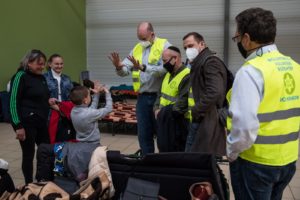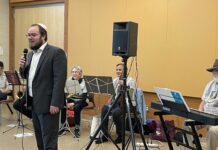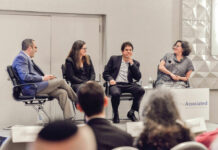
During his journey in April to the Polish-Ukrainian border, Rabbi Ari J. Goldstein of Temple Beth Shalom in Arnold recalled meeting many Ukrainian refugees who had crossed over to escape the Russian invasion, including one woman who fled with her daughter in tow.
“I met a woman who had come over with her daughter from the town of Mykolaiv,” said Goldstein, a resident of Arnold. “And she shared with me the story about how her house has been destroyed … about how she, at the last minute, was forced to run, she didn’t know where she was going, and how the stress of coming over the border, and the anxiety of coming to a border not knowing what to expect, not knowing who’s going to be there, where to go.”
The woman expressed, Goldstein continued, how after crossing the border, “just how grateful she was to be welcomed, and just helped and assisted and placed in warm, kind of a loving environment, so her child, who she said wakes up every night screaming, kind of would be at least settled and a little more calm. As calm as she can be.”
Goldstein traveled to the border area as part of a group of 27 other Reform rabbis from across the United States, for the purpose of providing the approximately 3 million refugees who had come to Poland with what help they could.
The group, named “Hineni” — which Goldstein translated as “here I am, and I’m ready to do whatever’s necessary” — originated from a Facebook post by Rabbi Jeffrey Salkin of West Palm Beach, Fla., calling for volunteers to help take some kind of action regarding Ukraine. As others started signing on, a more concrete course of action began to take shape.
Partnering with Jonathan Ornstein, the executive director of JCC Krakow, Hineni’s group included rabbis from New York, Seattle, Las Vegas and more, said Goldstein. Goldstein himself departed the U.S. on April 9, landing in Krakow before journeying to the city of Przemysl, about 40 miles from the Ukrainian city of Lviv. Then he headed to the border crossing at Medyka, before returning to the States on April 14. Goldstein brought with him five large duffel bags’ worth of pain relief medicines, such as Tylenol or Advil, and vitamins for refugees, while other rabbis brought items like clean underwear or feminine supplies.
When first planning for the trip in mid- to late-March, Goldstein expected to focus on tasks like spooning out soup and putting out cots, he said. By the time he arrived, though, Polish authorities had gotten a greater handle on the infrastructure needed for those tasks. As such, while Goldstein and his companions still did things like organizing medicine, clothing and other supplies, they also worked to “give strength to various different organizations and institutions,” as well as traveling to the border to provide comfort and support to the refugees at that difficult time.
In addition, Goldstein and his group served to bear witness to what was taking place in Poland, so they could use the platforms they had, such as their in-person congregations or their social media profiles, to “communicate the significance of what’s happening, the horrors of what’s happening, and the work that these institutions in Poland are doing to help with it, and of course to garner support from America for these various institutions.”
Goldstein was proud to note that of the NGOs near the border, a disproportionate number were Israeli.
After crossing the border at Medyka, refugees would be taken to the centers that had been established at Przemysl, Goldstein said, where they could gather themselves and get some food and sleep.
At the border, a doctor told Goldstein that, of all the supplies they are in need of, what they currently need most are rape kits, he said.
“They’ve completely run out of rape kits,” Goldstein said. “Because it’s something that, in large numbers, they never expected there to be such sexual abuse as they saw of various refugees coming across the border.”
On why he felt compelled to make the journey to help the refugees, Goldstein answered with a page from history.
“Seventy-five years ago, our people were in Poland and were calling out for help, but unfortunately no one was there to answer the call,” Goldstein said. “And so we wanted to fix, to change that history of Poland, and say that now that others are coming, calling out for help when they come to the border and the gates of Poland, that there are people who are answering the call, and helping and reaching out and providing comfort. So those Polish mistakes aren’t made a second time.”







